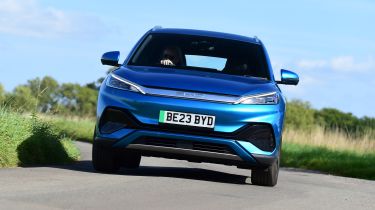EV affordability alarm! Running costs are £6k higher than for petrol cars, say car clubs
Running costs for car share club EVs are £6k higher than ICE equivalents according to new data

Car sharing clubs are raising the alarm over worsening EV affordability, and for the first time have reduced the proportion of electric vehicles on their fleets.
Car clubs are membership organisations typically offering pay-as-you-go access to shared vehicles, reducing the need for users to buy their own cars. There are around 5,500 car club vehicles operating in the UK currently and 350,000 active users, with the majority in London. As environmental and net zero challenges continue to bite in cities across the UK, some think car clubs have the potential for a much bigger future.
Yet new data from a charity working in the shared transport sector, CoMoUK, reveals that in 2024 the proportion of EVs in car club fleets dropped to 30 per cent from 35 per cent in 2023. The charity calls this “a marked decline, and the first time on record that the share of EVs within car clubs has fallen”.
Rising EV costs
Rising costs facing operators are being blamed for reducing the appetite for EVs in the sector. These include higher charging fees at public charging stations, as well as hard-hitting changes to policies around vehicle excise duty that removed EV exemptions from April this year.
As a result of all the factors affecting affordability, CoMoUK calculates that running an EV costs car share clubs an average of £6,276 more per year than a petrol equivalent.
“The fall in the proportion of electric vehicles within UK car club fleets is unprecedented and concerning, and illustrates the intense cost pressures being faced by operators,” says CoMoUK’s chief executive Richard Dilks.
“Car clubs have led the way in the shift to electric, and when you consider that only 4 per cent of privately-owned vehicles are EVs, they are still way ahead in this regard.
“However, there is a risk that this good progress will be lost unless action is taken at both a local and national level to ensure that operators aren’t being unfairly penalised,” he adds.
EV education needed
CoMoUK is calling for a range of measures to improve affordability, but suggests there’s also an education gap. Its research shows some car club users have concerns about charging, range and lack a general understanding of how EVs work.
Car club operators are queuing up to add their voices to CoMoUK’s demands for more investment in car sharing infrastructure such as dedicated parking bays, as well as measures to reduce operating costs.
Zipcar boss James Taylor says that since 2018 his firm has provided access to EVs for 170,000 drivers, but that “progress will be stalled” without action to reduce costs.
Richard Falconer of Co Wheels agrees, saying: “We want to use more EVs due to the environmental benefits, but they cost more to run than petrol vehicles, as the government adds VAT at 20 per cent for commercial electricity instead of the 5 per cent VAT on domestic electric. If the government wants to encourage the switch to electric vehicles, they need to change the rules to make pricing the same as EV owners who charge at home.”
Chief technology officer at Hiyacar Marc Roberts said: “EVs are a critical tool in the fight against climate change, however, the transition is being slowed by a persistent affordability gap. Until EVs become more cost-competitive, we risk delaying the full environmental benefits they can deliver.”
Tell us what you love (and hate) about your car. Take the Driver Power survey now and you could win a £1,000 John Lewis voucher...





